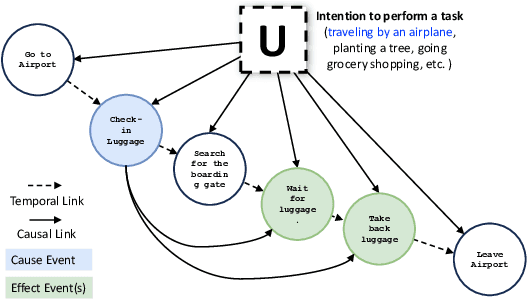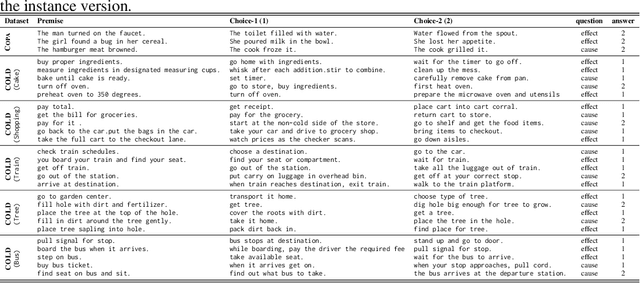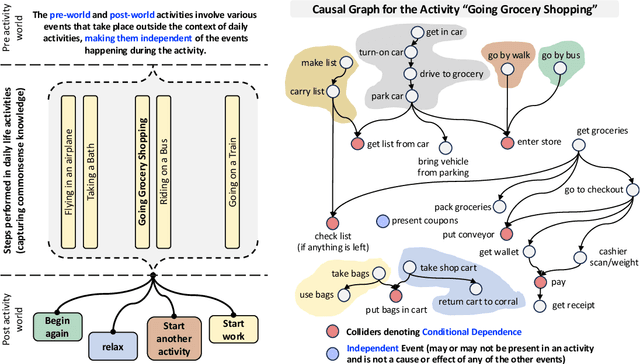Areeb Ahmad
Towards Quantifying Commonsense Reasoning with Mechanistic Insights
Apr 14, 2025Abstract:Commonsense reasoning deals with the implicit knowledge that is well understood by humans and typically acquired via interactions with the world. In recent times, commonsense reasoning and understanding of various LLMs have been evaluated using text-based tasks. In this work, we argue that a proxy of this understanding can be maintained as a graphical structure that can further help to perform a rigorous evaluation of commonsense reasoning abilities about various real-world activities. We create an annotation scheme for capturing this implicit knowledge in the form of a graphical structure for 37 daily human activities. We find that the created resource can be used to frame an enormous number of commonsense queries (~ 10^{17}), facilitating rigorous evaluation of commonsense reasoning in LLMs. Moreover, recently, the remarkable performance of LLMs has raised questions about whether these models are truly capable of reasoning in the wild and, in general, how reasoning occurs inside these models. In this resource paper, we bridge this gap by proposing design mechanisms that facilitate research in a similar direction. Our findings suggest that the reasoning components are localized in LLMs that play a prominent role in decision-making when prompted with a commonsense query.
COLD: Causal reasOning in cLosed Daily activities
Nov 29, 2024



Abstract:Large Language Models (LLMs) have shown state-of-the-art performance in a variety of tasks, including arithmetic and reasoning; however, to gauge the intellectual capabilities of LLMs, causal reasoning has become a reliable proxy for validating a general understanding of the mechanics and intricacies of the world similar to humans. Previous works in natural language processing (NLP) have either focused on open-ended causal reasoning via causal commonsense reasoning (CCR) or framed a symbolic representation-based question answering for theoretically backed-up analysis via a causal inference engine. The former adds an advantage of real-world grounding but lacks theoretically backed-up analysis/validation, whereas the latter is far from real-world grounding. In this work, we bridge this gap by proposing the COLD (Causal reasOning in cLosed Daily activities) framework, which is built upon human understanding of daily real-world activities to reason about the causal nature of events. We show that the proposed framework facilitates the creation of enormous causal queries (~ 9 million) and comes close to the mini-turing test, simulating causal reasoning to evaluate the understanding of a daily real-world task. We evaluate multiple LLMs on the created causal queries and find that causal reasoning is challenging even for activities trivial to humans. We further explore (the causal reasoning abilities of LLMs) using the backdoor criterion to determine the causal strength between events.
ScriptWorld: Text Based Environment For Learning Procedural Knowledge
Jul 08, 2023



Abstract:Text-based games provide a framework for developing natural language understanding and commonsense knowledge about the world in reinforcement learning based agents. Existing text-based environments often rely on fictional situations and characters to create a gaming framework and are far from real-world scenarios. In this paper, we introduce ScriptWorld: a text-based environment for teaching agents about real-world daily chores and hence imparting commonsense knowledge. To the best of our knowledge, it is the first interactive text-based gaming framework that consists of daily real-world human activities designed using scripts dataset. We provide gaming environments for 10 daily activities and perform a detailed analysis of the proposed environment. We develop RL-based baseline models/agents to play the games in Scriptworld. To understand the role of language models in such environments, we leverage features obtained from pre-trained language models in the RL agents. Our experiments show that prior knowledge obtained from a pre-trained language model helps to solve real-world text-based gaming environments. We release the environment via Github: https://github.com/Exploration-Lab/ScriptWorld
 Add to Chrome
Add to Chrome Add to Firefox
Add to Firefox Add to Edge
Add to Edge